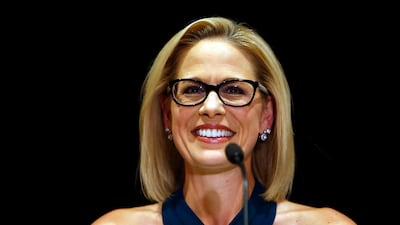A razor sharp win for Democrats in Arizona was attributed to positive messaging that resonated with independent voters who rejected a relentlessly negative Republican campaign tied closely to President Donald Trump.
Kyrsten Sinema's victory over Martha McSally on Monday came after almost a week of late ballot counting, ending a race that was one of the most closely watched in the country.
Ms Sinema, 42, made history with the result, becoming the first Democrat to win a US Senate seat in Arizona since 1994 and the first woman ever to do so in the state.
Her win narrows the Republican majority in the Senate to four seats (51-47), with two more Senate races yet to be resolved.
Having endured so-called attack ads from the McSally campaign and other Republican-affiliated groups, the winner had the last word on the race in a victory speech on Monday night.
“Arizona rejected what has become far too common in our country: name-calling, petty personal attacks, and doing and saying whatever it takes just to get elected,” Ms Sinema told a small crowd of supporters.
Ms McSally, a former US Air Force fighter pilot, had moved increasingly close to the anti-immigration message – Arizona borders Mexico - of President Trump during the final weeks of the race.
But that narrowed her audience of voters, particularly in Ms Sinema's stronghold of Phoenix which she has represented in the House of Representatives prior to last Tuesday's election.
Ms Sinema ultimately won the backing not only of Democrats but also Republicans and particularly independent voters who did not like Mr Trump.
As a sign of her broad coalition, Spanish-speaking women took to their phones to tell friends and relatives of the Democratic victory, while Latino political leaders used social media to suggest that her election was a breakthrough for their community.
“Ultimately, Sinema ran a very disciplined campaign for the beginning and her hard work paid off. Her centrist and less partisan messaging is what put her over the top when undecided, female and independent voters surged at the end,” Paul Bentz, a pollster and political analyst in Phoenix told The National.
Ms Sinema's win achieves a longtime Democratic goal of making Arizona, with its growing Latino population, a competitive state in presidential elections. And she did it by pointedly not running against the president, who won here in 2016, or even critiquing his hardline immigration stance.
The Democrat Senate candidate had targeted moderate Republican and independent women by painting herself as a nonpartisan problem-solver who voted to support Mr Trump's agenda 62 percent of the time in Congress. Her nearly single-issue campaign talked about the importance of health care and protections for people with pre-existing conditions.
She knew Ms McSally was vulnerable there because she backed the Republicans' failed attempt to repeal president Barack Obama's health care law.
It is questionable, however, if Ms Sinema's tactics of sticking to the political centre in conservative-leaning Arizona could be repeated in a presidential election given the broader sweep and identity politics involved over a longer campaign, but it may be a guide for Democrats who hope to expand the electoral map in 2020. While some progressive won important races in California, Colorado and Kansas, the left's highest-profile champions disappointed on election day, allowing Republicans to retain control of the Senate.
Despite its image as a staunch Republican bastion, Arizona is attracting younger, educated voters from elsewhere in the US. In this election, Democrats expanded their share in the state legislature, although they're still the minority.

